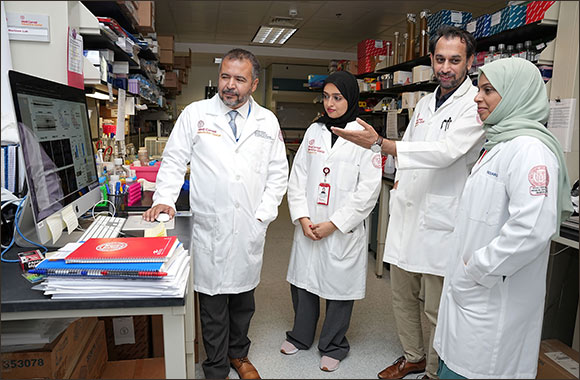
New WCM-Q research probes molecular processes that cause diabetes
Doha – June 23, 2024: Researchers at Weill Cornell Medicine-Qatar (WCM-Q) have made new discoveries about the complex metabolic and genetic processes which drive the formation of new fat cells, shedding light on the possible causes of obesity and its complications, such as inflammation and metabolic diseases like type 2 diabetes.
Using CRISPR gene editing technology, the researchers demonstrated that a protein called UHRF1 plays a key role in the regulation of the formation of new fat cells, known as adipogenesis. They also showed that the UHRF1 protein suppresses fibrosis, which is the hardening or scarring of bodily tissues and is a characteristic of many inflammatory illnesses. Increased fibrosis in the adipose tissue is a hallmark of insulin resistance and adipose tissue dysfunction.
Working with mouse cells in the laboratory, the researchers used CRISPR to delete a gene that codes for the production of the UHRF1 protein. They then demonstrated that these UHRF1-knock out cells showed significantly reduced levels of adipogenesis, a process of differentiating fat cells from their precursors. The WCM-Q researchers went a step further by using the college's advanced genomics and bioinformatics analysis tools to identify the altered molecular and cellular pathways involved in adipogenesis regulation, which are impacted by UHRF1. This led to the researchers successfully identifying elevated levels of the cytokine TGFβ and its downstream targets. TGFβ, which stands for transforming growth factor beta, is a fibrosis regulator. Additionally, when TGFβ goes awry, it is known to drive the transformation of normal cells into aggressively growing cancer cells.
The researchers also demonstrated that UHRF1-depleted cells show increased expression and secretion of TGFβ as well as Glycoprotein Nonmetastatic Melanoma Protein B (GPNMB). They also provided evidence that treating cells with GPNMB led to a reduction in adipogenesis and an increase in TGFβ levels and signaling. Elevated TGFβ in obese subjects is linked to a poor obesity complication outcome, with symptoms including hypertension, diabetes, inflammation, and adipose tissue fibrosis. Regulation of TGFβ is important because it is critical for many metabolic processes. After demonstrating the results in experiments on mouse genes, the team confirmed the same findings in tests on human cells.
This new discovery provides greater understanding of how the metabolism functions, as well as suggesting potential targets for the creation of new drug therapies for the clinical management of obesity and associated metabolic disorders.
WCM-Q's Dr. Muneera Vakayil, postdoctoral associate in microbiology & immunology, is the lead author of the paper, which has been published in scientific reports, a nature group publication. Dr. Vakayil said: 'This has been a really exciting piece of research because it presents potential therapeutic targets for type 2 diabetes. We are looking forward to conducting more research in this area to further improve our understanding of the processes which drive metabolic disorders.'
The publication of the paper marks a significant career milestone for Dr. Vakayil as it forms part of her PhD, which she pursued at Hamad Bin Khalifa University.
Other WCM-Q researchers who worked on the paper were Dr. Nayef Mazloum, assistant professor of microbiology & immunology; Dr. Aisha Madani Al-Malki, postdoctoral associate in microbiology & immunology; Dr. Yasser Majeed, research associate in microbiology & immunology; Dr. Shahina Hayat, senior research specialist; Shameem Yonuskunju, senior bioinformatics data analyst; Yasmin Ali Mohamoud, genomics core assistant director; Dr. Joel Malek, associate professor of genetic medicine, and Dr. Karsten Suhre, professor of physiology and biophysics and director of the bioinformatics core. Maha V. Agha of the Translational Research Institute at Hamad Medical Corporation also contributed to the paper.
Dr. Mazloum said: 'I offer my warmest congratulations to Dr. Vakayil for being the lead author of an excellent piece of research. This paper dramatically enhances our understanding of some very intricate molecular processes that underpin obesity and type 2 diabetes, which pose a serious threat to the health of a great many people all over the world. Furthermore, these discoveries provide important new leads for us to follow in our ongoing mission to develop a truly comprehensive understanding of metabolic disorders.'
The research was supported by the Biomedical Research Program (BMRP) at WCM-Q, a program supported by Qatar Foundation.
Home >> Healthcare and Fitness Section
200 Students Dive into Robotics Workshops in Qatar
Artemis Education Appoints World Champion Emma Igelström as Director of Aqu ...
Qatar Insurance Group Recognized at Google Cloud Summit Doha 2025 for Driving In ...
Education Above All Foundation and the American University of Beirut Celebrate t ...
Celebrate Eid with a Summer Glow: Catrice Launches Luxe Highlights for the Seaso ...
Doha Climate Talks Concludes with Enhanced Regional Climate Cooperation Commitme ...
Airline Profitability to Strengthen Slightly in 2025 Despite Headwinds
Luis Gallego Chairs IATA Board
Sony Middle East and Africa and Modern Home Introduce the Next Evolution of Nois ...
The Raptor Roar: A Legacy of High-Performance Off-Road Domination
Saleh Al Hamad Al Mana Co. Launches Special Offer on All-New Nissan Patrol 2025
Raffles doha appoints chef cristhian serraino as head chef of ALBA
essence Is Springing Into Season with the Glowiest Drop: Hydra Kiss LIP OIL
ESG, AI, and Architecture – Object 1's Future-Ready Vision
CASIO Unveils the G-SHOCK GA-2100BM: A Stylish and Durable Summer Essential
SAS Forecasting Hackathon Unveils Future Innovators at University of Doha for Sc ...
Air Cargo Demand up 5.8% in April
Google Cloud Summit Doha Celebrates Two-Year Anniversary of Local Region, Showca ...
Cartier Launches En Équilibre High Jewellery Collection In Stockholm


